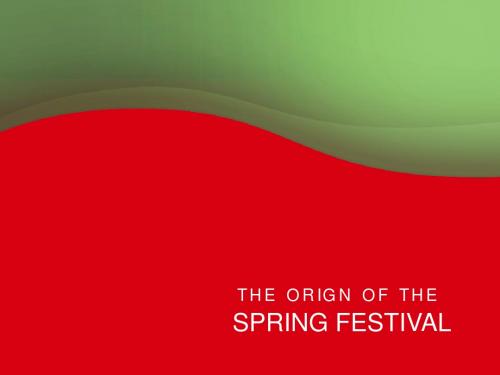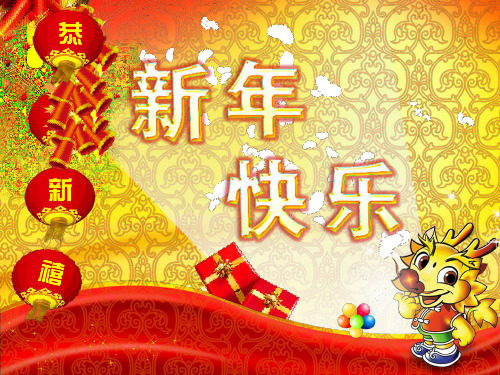英语春节ppt (1)
合集下载
(完整版)春节习俗英文PPT

Description
Summary
It is customary for people to stay up late on New Year's Eve, known as "nian gao", to welcome the new year.
Description
Staying up late on New Year's Eve is a way to show respect to the new year and to avoid bad luck. People usually stay up late to watch the Spring Festival Gala on TV or have family gatherings, playing cards or board games. This practice is also known as "nian gao".
02
Preparation before the Spring Festival
Sweeping Dust to Get Rid of Bad Luck: Before the Spring Festival, people traditionally clean their houses to sweep away any bad luck and make way for incoming good luck. This practice is known as "sweeping dust".
汇报人:可编辑
2023-12-24
(Complete version) Spring Festival customs in English
Summary
It is customary for people to stay up late on New Year's Eve, known as "nian gao", to welcome the new year.
Description
Staying up late on New Year's Eve is a way to show respect to the new year and to avoid bad luck. People usually stay up late to watch the Spring Festival Gala on TV or have family gatherings, playing cards or board games. This practice is also known as "nian gao".
02
Preparation before the Spring Festival
Sweeping Dust to Get Rid of Bad Luck: Before the Spring Festival, people traditionally clean their houses to sweep away any bad luck and make way for incoming good luck. This practice is known as "sweeping dust".
汇报人:可编辑
2023-12-24
(Complete version) Spring Festival customs in English
春节英文介绍ppt课件

Juniors will greet seniors, wishing them health and longevity, while seniors will give juniors some gift money as a wish for their safety in the coming Nhomakorabeayear.
In addition to pasting paper-cuts on windows, it is common for Chinese to paste the character “fu (福)”on walls or doors. “Fu” shows people’s yearning toward a good life. Some people even invert the character “fu” means "fu" arrive in Chinese.
Spring Festival traditional food
With the development of mobile communication, more and more people are using instant messengers such as QQ, WeChat, microblog and so on to express their good wishes to relatives or friends who are far awar. A lot of interesting emoji(表情包) are created to make the atmosphere active.
Also, pictures of the gods of doors will be posted on front doors to ward off evil spirits.
In addition to pasting paper-cuts on windows, it is common for Chinese to paste the character “fu (福)”on walls or doors. “Fu” shows people’s yearning toward a good life. Some people even invert the character “fu” means "fu" arrive in Chinese.
Spring Festival traditional food
With the development of mobile communication, more and more people are using instant messengers such as QQ, WeChat, microblog and so on to express their good wishes to relatives or friends who are far awar. A lot of interesting emoji(表情包) are created to make the atmosphere active.
Also, pictures of the gods of doors will be posted on front doors to ward off evil spirits.
春节英语PPT

Sweeping the Dust
“Dust” is homophonic with “chen”(尘)in Chinese, which means old and past. In this way, “sweeping the dust” before the Spring Festival means a thorough cleaning of houses to sweep away bad luck in the past year. This custom shows a good wish of putting away old things to welcome a new life. In a word, just before the Spring Festival comes, every household will give a thorough cleaning to bid farewell to the old year and usher in the new.
T H E O R IG N O F T H E
SPRING FESTIVAL
T he S pring F e stiva l is the la rge st a nd m ost im porta nt fe stiva l in C hina . It is the first da y of the luna r ca le nda r a nd usua lly occurs som e w he re be tw e e n Ja nua ry 30 a nd F e brua ry 20. T his tra ditiona l fe stiva l is a lso a fe stiva l of re union; no m a tte r how fa r a w a y pe ople a re from the ir hom e s, the y will try the ir be st to ge t
精美英文春节习俗PPT

Eating union dinner
The union dinner is an important part of the Spring Festival All family members will come together to have a big meal on this day
VS
The sweeping cost is usually done in the morning, and people of wear red clothes to symbolize good luck and happiness
After sweeping the dust, families will then prepare New Year's goods, including food, clothing, and other necessities
Setting off firetrackers also has the meaning of scaling away bad luck and welcoming good luck It is a traditional custom that has been passed down from generation to generation
The Spring Festival is a time for family reunion, as many Chinese people will return home to celebrate with their families
It is a time for giving red envelopes (hongbao) and making New Year's wishes
春节习俗介绍(英文版)PPT课件

精选ppt课件2021ring Festival
❖Many customs accompany the Spring Festival. Some are still followed today, but others have weakened.
精选ppt课件2021
精选ppt课件2021
13
4.The Spring Festival Eve
精选ppt课件2021
14
5.New Year Day
❖On New Year, everybody dresses up. First they extend greetings to their parents. Then each child will get money as a New Year gift, wrapped up in red paper. ❖People in northern China will eat jiaozi, or dumplings, as they think "jiaozi" in sound means "bidding farewell to the old and ushering in the new". ❖Southern Chinese eat niangao,because as a homophone, niangao means "higher and higher, one year after another."
精选ppt课件2021
1
Content
❖Origin of the Spring Festival (legend) ❖Custom of the Spring Festival
(完整版)春节习俗英文PPT

Description
The meal typically consists of dishes that symbolize prosperity, health, and good luck. Dishes such as fish and spring rolls are common, as they represent abundance and the rolling forward of good fortune.
01
Introduction to Spring Festival
Spring Festival is the most important traditional holiday in China, also known as Chinese New Year.
It is said that the origin of Spring Festival can be traced back to the "Nian" in ancient times, a monster that preyed on people during the winter solstice. To驱赶 "Nian", people would ignite fireworks, set off firecrackers, and wear red paper cutouts on their doors to scare it away.
(Complete version) Spring Festival customs in English
汇报人:可编辑
2023-12-23
contents
目录
Introduction to Spring FestivalSpring Festival customsTraditional activities during the Spring FestivalSymbolic items of the Spring FestivalThe Food Culture of Spring Festival
The meal typically consists of dishes that symbolize prosperity, health, and good luck. Dishes such as fish and spring rolls are common, as they represent abundance and the rolling forward of good fortune.
01
Introduction to Spring Festival
Spring Festival is the most important traditional holiday in China, also known as Chinese New Year.
It is said that the origin of Spring Festival can be traced back to the "Nian" in ancient times, a monster that preyed on people during the winter solstice. To驱赶 "Nian", people would ignite fireworks, set off firecrackers, and wear red paper cutouts on their doors to scare it away.
(Complete version) Spring Festival customs in English
汇报人:可编辑
2023-12-23
contents
目录
Introduction to Spring FestivalSpring Festival customsTraditional activities during the Spring FestivalSymbolic items of the Spring FestivalThe Food Culture of Spring Festival
中国春节英语课件PPT21张

中国春节
Part 1 Name
What do we call “春节” in English?
• Spring Festival • Lunar New Year
• Chinese New Year
Байду номын сангаас
• Chinese Spring Festival, • also called Lunar New Year, has more than 4,000 years of history. Being one of the traditional Chinese festivals, • it is the grandest and the most important festival for Chinese people. It is also the time for the whole families to get together, which is similar with Christmas Day to the westerners.
• 中国的春节,也被称 为农历新年,迄今已 有四千多年的历史。 对于中国人来说,这 是规模最大,最重要 的传统节日。就如同 西方的圣诞节一样, 春节是一家团聚的日 子。
• 春节是中华民族最隆重 的传统佳节,同时也是 中国人情感得以释放、 心理诉求得以满足的重 要载体,是中华民族一 年一度的狂欢节和永远 的精神支柱。春节与清 明节、端午节、中秋节 并称为中国四大传统节 日。
• 据说,春节起初源于人们在农历腊月祭祀先 祖,在那期间,人们为了祭祀会做大扫除, 沐浴换衣等等。后来人们开始在那一天敬奉 神明。春节期间正好各种农耕活动结束,人 们有空余时间。最开始的祭祀日期由于农耕 活动并不固定,直到汉朝(公元前202年-公 元220年)才固定下来。祭祀神明和先祖的传 统延续下来,但并不像以前那样浩大。春节 也是春天的开始,所以人们会举办各种仪式 迎接春天的到来。
Part 1 Name
What do we call “春节” in English?
• Spring Festival • Lunar New Year
• Chinese New Year
Байду номын сангаас
• Chinese Spring Festival, • also called Lunar New Year, has more than 4,000 years of history. Being one of the traditional Chinese festivals, • it is the grandest and the most important festival for Chinese people. It is also the time for the whole families to get together, which is similar with Christmas Day to the westerners.
• 中国的春节,也被称 为农历新年,迄今已 有四千多年的历史。 对于中国人来说,这 是规模最大,最重要 的传统节日。就如同 西方的圣诞节一样, 春节是一家团聚的日 子。
• 春节是中华民族最隆重 的传统佳节,同时也是 中国人情感得以释放、 心理诉求得以满足的重 要载体,是中华民族一 年一度的狂欢节和永远 的精神支柱。春节与清 明节、端午节、中秋节 并称为中国四大传统节 日。
• 据说,春节起初源于人们在农历腊月祭祀先 祖,在那期间,人们为了祭祀会做大扫除, 沐浴换衣等等。后来人们开始在那一天敬奉 神明。春节期间正好各种农耕活动结束,人 们有空余时间。最开始的祭祀日期由于农耕 活动并不固定,直到汉朝(公元前202年-公 元220年)才固定下来。祭祀神明和先祖的传 统延续下来,但并不像以前那样浩大。春节 也是春天的开始,所以人们会举办各种仪式 迎接春天的到来。
上课春节风俗英文PPT课件

第14页/共30页
Sweeping the Dust( 扫尘 ) “Dust” is homophonic(同音) with “chen”(尘) in Chinese, which means old and past. In this way, “sweeping the dust” before the Spring Festival means a thorough cleaning of houses to sweep away bad luck in the past year. This custom shows a good wish of putting away old things to welcome a new life.
give gifts
send New Year’s
ve New Year lucky money
Family Celebrations 家庭庆祝活动
What do families in your hometown do during the Spring
Festival ?
red-paper couplets
torches
firecrackers
第2页/共30页
What do families in your hometown do during the Spring
Festival ?
put up New Year do spring
couplets
cleaning
3. 打牌
12.大扫除
play cards
do spring cleaning
4. 打麻将
play majiang
5. 送礼物
give gifts
Sweeping the Dust( 扫尘 ) “Dust” is homophonic(同音) with “chen”(尘) in Chinese, which means old and past. In this way, “sweeping the dust” before the Spring Festival means a thorough cleaning of houses to sweep away bad luck in the past year. This custom shows a good wish of putting away old things to welcome a new life.
give gifts
send New Year’s
ve New Year lucky money
Family Celebrations 家庭庆祝活动
What do families in your hometown do during the Spring
Festival ?
red-paper couplets
torches
firecrackers
第2页/共30页
What do families in your hometown do during the Spring
Festival ?
put up New Year do spring
couplets
cleaning
3. 打牌
12.大扫除
play cards
do spring cleaning
4. 打麻将
play majiang
5. 送礼物
give gifts
- 1、下载文档前请自行甄别文档内容的完整性,平台不提供额外的编辑、内容补充、找答案等附加服务。
- 2、"仅部分预览"的文档,不可在线预览部分如存在完整性等问题,可反馈申请退款(可完整预览的文档不适用该条件!)。
- 3、如文档侵犯您的权益,请联系客服反馈,我们会尽快为您处理(人工客服工作时间:9:00-18:30)。
• 原来,“夕”最怕红色、火光和炸响。这时,婆 婆的家门打开,只见院内一位身披红袍的老人在 哈哈大笑。“夕”大惊失色,狼狈逃蹿了。 第二 天也是正月初一,避难回来的人们见村里安然无 恙,十分惊奇。这时,老婆婆才恍然大悟,赶忙 向乡亲们述说了乞讨老人的许诺。这件事很快在 周围村里传开了,人们都知道了驱赶“夕”兽的 办法。从此每年除夕,家家贴红对联、燃放爆竹 ;户户烛火通明、守更待岁。初一一大早,还要 走亲串友道喜问好。这风俗广泛流传,成了中国 民间最隆重的传统节日。
守岁 Staying Up Late on New Year's Eve
The tradition of staying up late to see New Year in originated from an interesting folk tale. In ancient China there lived a monster named Year, who was very ferocious. Year always went out from its burrow on New Year’s Eve to devour people. Therefore, on every New Year’s Eve, every household would have supper together. After dinner, no one dared go to sleep and all the family members would sit together, chatting and emboldening each other. Gradually the habit of staying up late on New Year’s Eve is formed. Thus in China, “celebrating the Spring Festival” is also called “passing over the year (guo nian)”. However, now there are less and less people in cities who will stay up late to see New Year in.
“Dust” is homophonic with “chen”(尘) in Chinese, which means old and past. In this way, “sweeping the dust” before the Spring Festival means a thorough cleaning of houses to sweep away bad luck in the past year. This custom shows a good wish of putting away old things to welcome a new life. In a word, just before the Spring Festival comes, every household will give a thorough cleaning to bid farewell to the old year and usher in the new.
To the ancient times period, there is a kind of fierce monster called“ year”.Its facial look is ferocious, the born nature is bloodthirsty, eating the birds and beasts, the fish and shellfish insect without feet particularly
The firecracker is a unique product in China. In ancient China, the sound of burning bamboo tubes was used to scare away wild animals and evil spirits. With the invention of the gunpowder, “firecracker” is also called “鞭炮biānpào” (“炮” in Chinese means gun) and used to foster a joyful atmosphere. The first thing every Chinese household does is to set off firecrackers and fireworks, which are meant to bid farewell to the old year and usher in the new.
In the past few years, such an activity was completely or partially forbidden in big cities including Beijing due to fire and personal casualty caused by burning firecrackers. However, some Chinese thought that a Spring Festival without firecrackers was not lively enough and they burned firecrackers by stealth. So in recent years, the ban was canceled again. This shows that burning firecrackers is a very important activity during the Spring Festival.
The origin of the Lunar New Year Festival can be traced back thousands of years, involving a series of colorful legends and traditions. One of the most famous legends is Nian, an extremely cruel beast that the ancients believed would devour people on New Year's Eve. To keep Nian away, red-paper couplets are pasted on doors, torches are lit, and firecrackers are set off throughout the night, because Nian is said to fear the color red, the light of fire, and loud noises.
.
Sweeping the Dust(扫尘)
Having Jiaozi(吃饺子)
Pasting Spring Couplets(贴春联)
Setting off Firecrackers(放鞭炮)
Pasting New Year Prints(贴年画)
New Year‘s Visit and Gift Money(拜年和压 岁钱)
• 关于“春节”的起源,有一种传说是:中国古时候有一种 叫“夕”的兽(又名"年"),头长触角,凶猛异常。“夕” 长年深居海底,每到特定的一天(现在说的除夕)才爬上 岸,吞食牲畜伤害人命。因此,每到除夕这天,村村寨寨 的人们扶老携幼逃往深山,以躲避“夕”兽的伤害。有一 年除夕,从村外来了个乞讨的老人。乡亲们一片匆忙恐慌 景象,只有村东头一位老婆婆给了老人些食物,并劝他快 上山躲避“夕”兽,那老人把胡子撩起来笑道:“婆婆若 让我在家呆一夜,我一定把‘夕’兽赶走。”老婆婆继续 劝说,乞讨老人笑而不语。 半夜时分,“夕”兽闯进村。 它发现村里气氛与往年不同:村东头老婆婆家,门贴大红 纸,屋内烛火通明。“夕”兽浑身一抖,怪叫了一声。将 近门口时,院内突然传来“砰砰啪啪”的炸响声,“夕” 浑身战栗,再不敢往前凑了。
The Spring Couplet”, also called “couplet” and “a pair of antithetical phrases”. On the eve of the Spring Festival, every household will paste on doors a spring couplet written on red paper to give a happy and prosperous atmosphere of the Festival. In the past, the Chinese usually wrote their own spring couplet with a brush or asked others to do for them, while nowadays, it is common for people to buy the printed spring couplet in the market.
On New Year’s Eve, the whole family will sit together to make jiaozi and celebrate the Spring Festival. old ingot (金元宝) from ancient China. So people eat them and wish for money and treasure. You cannot have a complete Spring Festival without having jiaozi.
贴窗花和“福”字 Pasting Paper-cuts and “Up-sided Fu” Paper-cuts, usually with auspicious patterns, give a happy and prosperous atmosphere of the Festival and express the good wishes of Chinese people looking forward to a good life. In addition to pasting paper-cuts on windows, it is common for Chinese to paste the character “fu(福)”, big and small, on walls, doors and doorposts around the houses. “Fu(福)” shows people’s yearning toward a good life. Some people even invert the character “fu(福)” to signify that blessing has arrived because “inverted” is a homonym for “arrive” in Chinese. Now many kinds of paper-cuts and “fu(福)” can be seen in the market before the Festival.
